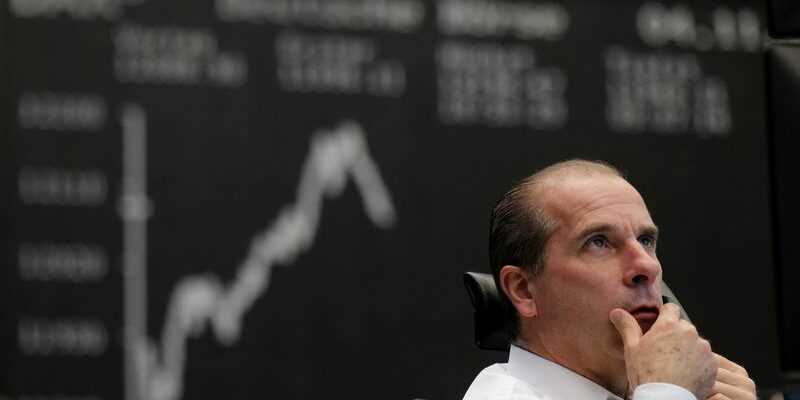by Claude Chendjou
PARIS (Reuters) – European stock markets ended lower on Friday and Wall Street was also trading in the red at mid-session, as fears of an acceleration in monetary tightening took over corporate results after comments from several central bank officials in favor of a rate hike.
In Paris, the CAC 40 ended down 1.99% at 6,581.42 points. The British Footsie fell by 1.39% and the German Dax by 2.48%.
The EuroStoxx 50 index fell 2.24%, the FTSEurofirst 300 1.74% and the Stoxx 600 1.79%.
Over the week as a whole, the Parisian index fell by 0.12% and the pan-European Stoxx 600 by 1.42%.
Jerome Powell, the chairman of the US Federal Reserve, said Thursday that a 50 basis point rate hike was “on the table” at the institution’s May 3-4 monetary policy meeting.
On Friday, Christine Lagarde, President of the European Central Bank (ECB), said for her part that there was a good chance that the institution will raise its interest rates this year.
The vice-president of the ECB, Luis de Guindos, had the day before shown himself favorable to a cessation of the purchases of bonds of the institution from the month of July, a prelude to a first rate hike.
On Friday, the money markets in the euro zone were anticipating an 80-point increase in ECB rates by the end of the year.
“Given the restrictive (hawkish) statements this week, I think we are seeing positions taken for a rate hike before July,” said Piet Christiansen, analyst at Danske Bank.
In the United States, the yield on two-year Treasury bills, the most sensitive to expectations of changes in key rates, hit a peak of 2.789% on Friday, the highest since December 2018, while that of ten years fell. deals at 2.898%.
The yield of the ten-year German Bund, a benchmark for the euro zone, ended on a gain of 3.5 points to 0.958%.
The French OAT rate of the same maturity rose 2.8 points to 1.4171%.
VALUES IN EUROPE
In addition to rates, the session in Europe was also driven by corporate results. Kering (-4.3%) ended up at the bottom of the CAC 40 after disappointing sales of its Gucci brand in the first quarter. The luxury giant led in its fall LVMH (-2.1%), Hermès (-1.7%) or Richemont (-2.2%).
The Franco-Italian eyewear manufacturer EssilorLuxottica for its part fell 2.6% after the slowdown in sales in China, while Renault dropped 1.3% after a 2.7% drop in turnover over the quarter. elapsed.
At the sector level, none of the major compartments escaped the downturn, with the biggest drops being in the assets of cyclical consumption (-1.8%), finance (-2.2%) or even new technologies (-1.8%).
The banking sector (-2.1%) did not benefit from the rise in rates as the yield spread between long-term and short-term bonds is narrowing, a sign of a risk of recession in the medium term .
Societe Generale, Deutsche Bank and Unicredit lost 1%, 2.9% and 2.2% respectively and in “techs”, sensitive to changes in the cost of credit, Capgemini, ASML and SAP fell by 1.5 % to 2.1%. The German enterprise software giant also announced a loss of revenue of 300 million euros linked to its withdrawal from Russia.
AT WALL STREET
At the time of the close in Europe, the Dow Jones fell 1.43%, the Standard & Poor’s 500 1.26% and the Nasdaq 0.82%.
Digital giants like Apple and Microsoft, Alphabet and Amazon fell 0.4% to 2%.
Side business results, Gap plunged 18% after a lowering of its revenue forecast for the first three months of the year and Verizon Communications 5.6% due to its outlook also considered disappointing.
Schlumberger (+3.1%) on the other hand was sought after in favor of a solid quarterly profit in a context of soaring oil prices.
THE INDICATORS OF THE DAY
Eurozone private sector activity growth picked up in April on the back of buoyant services, which rose to an eight-month high of 57.7 as consumers seemed to ignore rising prices for the time being. prices, show the first results of the S&P Global surveys
The British private sector, on the other hand, has suffered a marked slowdown in recent weeks with a composite “flash” index down to 57.6, its lowest level for three months, inflation and the conflict in Ukraine weighing on the activity of the services.
CHANGES
The dollar, up 0.64% against a basket of benchmark currencies, continues to benefit from the latest statements by Jerome Powell and reached its highest level in session since March 2020 at 101.6 points.
The euro, for its part, fell 0.58% to 1.0774 dollars, penalized by the remarks of Christine Lagarde, the president of the ECB, who said Thursday that the institution could lower its growth prospects in view of of the war in Ukraine. A government source also told Reuters that Germany would cut its growth forecast for this year to 2.2% from 3.6% previously.
OIL
Oil prices are falling on global demand fears as China extended a lockdown in Shanghai to fight the COVID-19 pandemic.
The barrel of Brent yields 1.66% to 106.52 dollars and that of American light crude (West Texas Intermediate, WTI) 1.58% to 102.11 dollars.
(Some data may show a slight shift)
(Report Claude Chendjou, edited by Sophie Louet)
Copyright © 2022 Thomson Reuters
